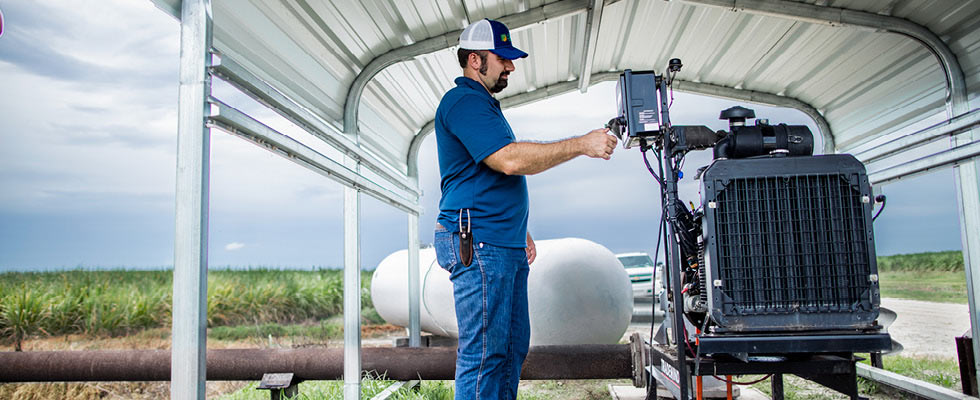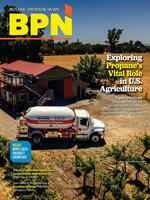
The safety landscape can often feel like a jungle for marketers selling propane to end users in the agriculture sector. Safe practices are critical in all farm operations, and as propane marketers partner in the agricultural space, they can be a contributor to reducing risk where possible while providing a valuable, versatile, cost-effective, safe and abundant domestic natural resource. What does this mean for propane marketers that work regularly with clients in the agriculture industry? Christopher Wagner, National Propane Gas Association vice president of codes, standards and safety, shared with BPN about the propane marketer’s relationship with farmers.
“From a regulatory standpoint, NFPA 58 doesn’t differentiate between agricultural applications versus typical domestic or commercial applications,” said Wagner. “The expected safety standards in an agricultural environment are generally similar to those in residential or commercial properties.
“Standard commercial property separation distances and tank quantities apply. However, there are specific considerations for liquid and vapor applications depending on the particular operations involved.”
Outside of standards and regulations, the habits and specifics of working on a farm must also be considered.
“Farmers are known for their resourcefulness and often look for ways to make their lives easier — they are the original DIYers. However, they may store things in close proximity to propane tanks or piping, which could pose risks. “
Putting on my hat as the former AmeriGas director of compliance and regulatory affairs, there are a couple of unique challenges with agriculture. Did the tank move? Have they changed anything around? Are they storing things in close proximity that could potentially put the container or piping at risk?”
Safety Risks Unique to the Farm
The dynamics of physical space and the products that go into growing crops also play a large role in a farm’s safety.
“Since land is critical for revenue generation, farmers want to use every square foot possible,” said Wagner. “This can lead to situations where tanks are moved to different areas, increasing the potential for contact or dislodging.
"Additionally, there are various chemicals used on farms that can increase the risk of corrosion to propane tanks and equipment. Regular inspections are crucial, especially if the farm’s operations are highly seasonal and conditions change during the off season.
“The biggest challenge is ensuring that safety measures are followed consistently, since agricultural operations can be dynamic and involve multiple individuals. You need to be vigilant. When visiting an agricultural environment, be aware of changes since your last visit. For example, notice if there seems to be increased traffic, tractor ruts near the tank, or a new driveway. These changes could indicate potential exposure to container and piping. A simple conversation with the farmer could resolve the issue.
“For example, if I see ruts, it means the farmer is driving through an area where I need to install crash protection or ask them to stop. Many of these issues can be resolved through conversation and customer relations.”
Prioritizing safety while maintaining a working relationship with clients is an important task for propane marketers, even if it can be difficult at times. What remains the propane marketer’s advantage is that there is not truly another fuel in the market that can service the needs of farmers quite as well as propane.
“Farmers want gas when they need it and don’t want to be impacted by their choice of propane over other fuels,” said Wagner. “Propane provides a wider range of opportunities on a farm compared to competitive liquid fuels. For example, heating a greenhouse with oil heat may work out OK, but it’s not going to be as efficient or as clean as using propane. For livestock or motors, propane competes easily with diesel fuel. Propane fuel prices don’t have the volatility when running pumps or motors as its counterparts diesel or gasoline because of its domestic predominance.”
Another unique aspect of propane use in the agriculture sector is the critical place it occupies in the growing cycle. When farmers require an energy source, it’s not so much a “want” as it is a “need.” Emphasizing safety in this type of urgent schedule is a challenge, to say the least.
“Usability is often overlooked. For instance, in frost damage prevention, where direct heat is applied to fields and circulated with fans during sudden cold snaps — such as in eastern Washington’s apple orchards — propane is the only viable source,” said Wagner. “That’s why the time to address concerns is in the spring and summer when repairs can be made without impacting the crop rather than during critical periods.
“Seeing the operation in effect for the first time can be a bit overwhelming. Imagine a 1,000-foot pipe, with holes drilled every 6 inches, running along the edge of a field. Propane vapor is pumped into the pipe at varying pressures and ignited to generate heat. Fans are then utilized to circulate the heat through the field. This is the only way farmers can keep their fields warm and protect against frost damage.
“Propane is an excellent solution, but you have to strike a balance between its portability, usefulness and safety. Establishing a strong and open relationship with your agricultural partners can go a long way in ensuring that they act responsibly and communicate proposed modifications or changes within their operations before they become a potential issue.”
Changing How We Talk About Regulations
What if ensuring the safe use of propane and fostering a productive and profitable client relationship with farmers were framed differently? Instead of talking about safety as a hindrance to a propane marketer’s sales efforts, safety conversations could themselves be seen as another valuable opportunity for propane marketers to invest in their agriculture customers.
“Different geographic areas have different considerations,” said Wagner. “My main concern is ensuring my customers’ safety, property and profitability. Their success directly benefits me. I don’t approach safety from a perspective of avoiding lawsuits. Instead, I focus on potential applications and educating farmers about the risks associated with using propane on their property.
“By guiding farmers and helping them make informed decisions, we become valuable partners in their business and contribute to their success. An injured farmer means lost work, potential land neglect and negative consequences for their family.
“Providing guidance and resources on safe propane use is a service to our customers. We can direct them to safety materials, technical training and industry-specific cut sheets. By sharing this information with farmers, we go beyond addressing potential legal issues and contribute to a healthy market where both farmers and propane marketers thrive.”
To this end, Wagner helped contribute to the Propane Education & Research Council’s recent safety guides — including the “Propane Safety on the Farm” guide — that are aimed at making safety best practices accessible to propane marketers and propane’s end users. The guides are an easy way for propane marketers to democratize safety education regarding propane use. This helps protect both the well-being of propane marketers’ clients and the viability of partnering markets (such as agriculture), which in turn benefits the entire industry.
This is one easy way to begin prioritizing the safety of the farmers you might be working with. It is at the same time an investment in creating the kind of professional relationships that your farming clients will come to appreciate.


